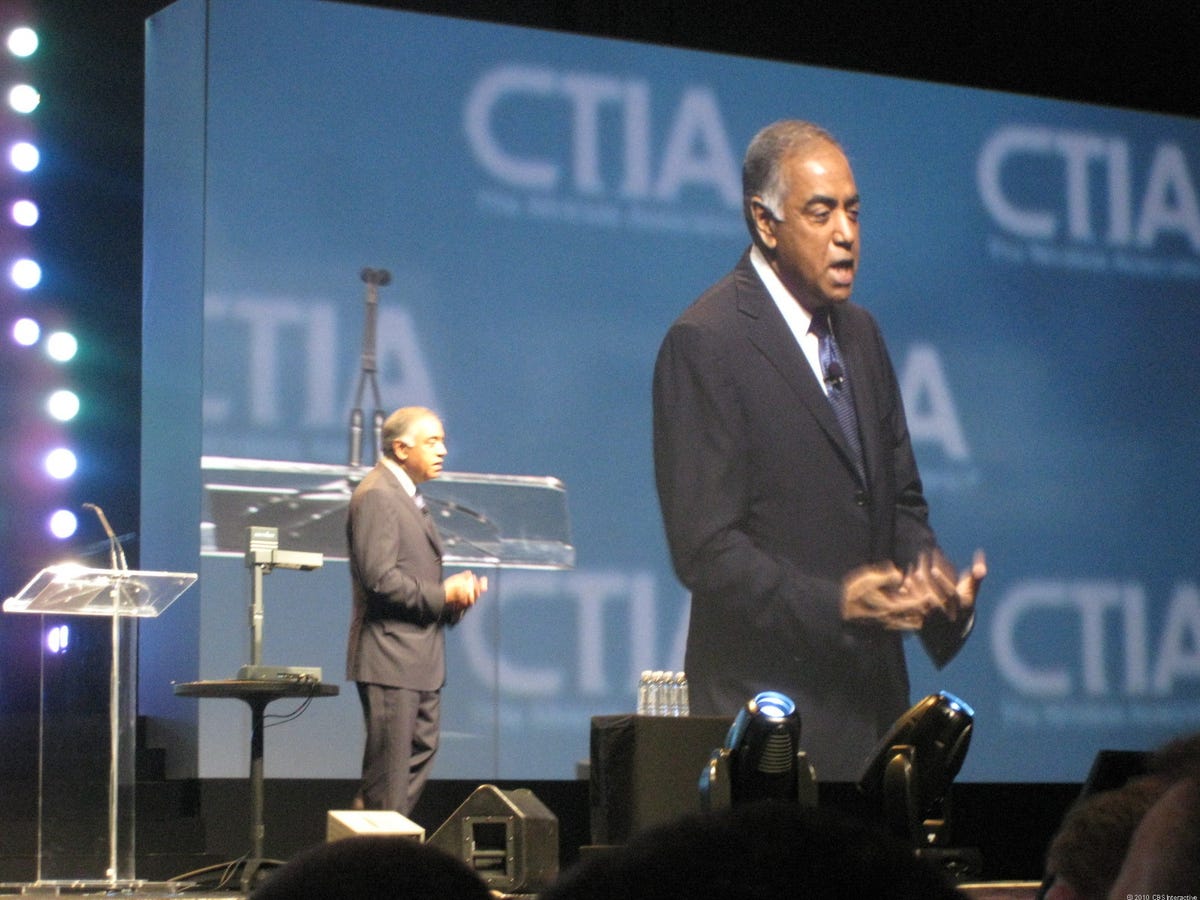
CNET/Marguerite Reardon
LightSquared Chief Executive Sanjiv Ahuja is trying to have his cake and eat it too. Literally.
Ahuja and his management team will celebrate his upstart company’s first anniversary on Thursday with cake and ice cream–a tradition from his days running France Telecom’s wireless giant Orange.
The milestone comes as LightSquared has quelled some doubts about the validity of its planned 4G network through a few customer wins and a round of financing. But it continues to face resistance from the traditional telecommunications giants, as well as the GPS industry, which has loudly expressed its concern that LightSquared’s network could disrupt various critical GPS devices. Skeptics note its 4G LTE network will lag behind the Verizon Wireless and AT&T.
Ahuja, however, appears unfazed by the rhetoric.
“The resistance is normal,” he told CNET on Monday. “We expect it.”
More interestingly, Ahuja expressed his confidence that the Federal Communications Commission would cut through the noise about the GPS issue and grant LightSquared the terrestrial-only waiver required to offer wireless service, something a group called the Coalition to Save Our GPS is fighting.
In fact, Ahuja is so confident he said that he isn’t planning for the possibility that the FCC denies LightSquared the waiver when the decision comes out in September.
“When you look at the testing and the technical data, there’s no reason to believe that the decision should go against LightSquared,” Ahuja said.
LightSquared filed a proposal with the FCC last month that it claims will get around most of the concerns that the network would cripple farm equipment, navigation devices, and other gadgets with high-precision GPS receivers. The plan consisted of using a different swath of spectrum that is further away from the GPS signals, reducing the risk of interference. The GPS coalition blasted the plan, calling it insufficient.
LightSquared has spent the last year trying to prove itself to a skeptical wireless industry as a purely wholesale retailer of 4G LTE services. The company has dealt with concerns that its majority owner, the Philip Falcone-run hedge fun Harbinger Capital, couldn’t raise the necessary funding for the build-out. The company also dealt with skepticism that it couldn’t sign any major customers.
The company has taken steps to prove the doubters wrong. In March, it announced deals with Best Buy and Leap Wireless. CNET reported last week that Sprint plans to confirm a network-sharing deal with LightSquared when it reports its second-quarter results on July 28.
Ahuja declined to comment on the deal with Sprint, although he confirmed the two were in discussions.
Chief Marketing Officer Frank Boulben said the company has signed up seven customers, although one hasn’t been made public yet. He added he was in active negotiations with 22 customers and helping another 30 develops a business model using its network.
One of the companies he is working with is a major consumer-electronics manufacturer, and Boulben said he envisions connected digital cameras and portable video game players to emerge from partnerships with LightSquared.
By the middle of next year, Ahuja said he expects LightSquared to have sold a quarter of the network capacity it had planned to sell by 2015, significantly higher than his initial forecast.
On the financing front, LightSquared earlier this month said it had recently obtained $265 million and $2.3 billion over the past year.
“The company’s recent capital raise indicates a continued ability to secure financing despite lingering concerns about GPS interference,” Deutsche Bank analyst Brett Feldman said in a note today.
Likewise, Ahuja expressed his comfort with the company’s ability to continue to fund the costly rollout of a wireless network.
“Our success with our customers is giving very high confidence to existing and new investors, who continue to invest,” Ahuja said.
Ahuja said he also plans to take his employees to Virginia national park for a music festival.
“It’s a time of opportunity and a time for excitement,” he said. “It’s serious recognition for how hard the team has worked.”
But perhaps the celebration is premature given the work the company has ahead of it.
The company is testing base stations now but doesn’t plan to test the network with its wholesale customers until the first half. Commercial launch of the service is expected until a year from now.
Verizon Wireless, meanwhile, is racing to build out its 4G LTE network, and will reach its 100th market this week. AT&T plans to launch its own such 4G network in five cities this summer. Ahuja said he has not had network-sharing discussions with either companies.
He added that networks don’t just spring up in a year, and that it takes time.
While the first year has been about establishing some legitimacy, the second year is about getting the network up and running, Ahuja said.
“Next year, it’s going to be about basic blocking and tackling,” he said. “We’ll be an aggressive competitor while we build our network.”



